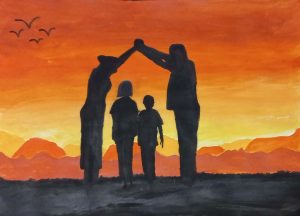The Mercy Foundation strongly supports a constitutionally enshrined Voice to Parliament. A constitutionally enshrined Voice will contribute to realising the vision and values of the Mercy Foundation, with potential to help restore, protect and uphold the human rights and dignity of our First Nations peoples, who are currently one of the most disadvantaged and marginalised groups on our planet.
Support for a Voice to Parliament
The Mercy Foundation proudly supports a constitutionally enshrined Voice to Parliament. The Mercy Foundation is a social justice organisation under the auspices of the Sisters of Mercy North Sydney. The Mercy Foundation’s vision is for a just, equitable and inclusive society, where all have dignity in God’s vision of mercy. The Foundation strives to eliminate poverty and injustice and promotes the human rights and dignity of all people.
A First Nations Voice to Parliament aligns with the key values of the Mercy Foundation:
- Dignity: respecting and recognising the inherent worth of each individual and helping them to achieve their full potential whilst maintaining their self esteem
- Empowerment: supporting people to reach their potential and exercise their rights
- Systemic change: focusing on the structural causes of and solutions to poverty and injustice
- Courage: being prepared to challenge individuals, structures, systems, practices, laws and policies which are unjust.
- Justice: acknowledging everyone has the right to be treated fairly and with dignity and equality.
- Leadership: with respect, integrity and wisdom, setting an example for others to follow
Rationale for supporting the Voice
Help end homelessness for First Nations peoples
Since 2008, the Mercy Foundation has focused on ending homelessness. The Foundation is informed by evidence and research and has developed expertise in ending homelessness. We are greatly troubled by the persistent overrepresentation of First Nations peoples in the homelessness population, being 10 times more likely to be homeless than non-Indigenous people. ¹ Dispossession, racism, poverty and intergenerational trauma are some of the root causes of homelessness, with successive policy responses failing to address key issues or bring about positive change.
The Voice to Parliament offers a means of addressing inequality and injustice. Through deep listening and with First Nations informed legislation and policy, the Voice has potential to restore the right to housing for First Nations peoples and the consequent positive impacts a home brings to all aspects of life.
Subsidiarity
In all our grants programs, the Mercy Foundation prioritises projects developed with the people most affected, based on the social justice principle of subsidiarity. This results in better and long-lasting outcomes. The Voice will ensure that First Nations peoples are listened to in matters that affect them.
Improve health and wellbeing
The Closing the Gap measures highlight the inequality and poor outcomes experienced by Aboriginal and Torres Strait Islander Peoples. Of the 18 socio-economic targets only four are on track.
Key measures not on track include:
- The life expectancy for males and females is 8.6 years and 7.8 years lower than non-Indigenous males and females.
- Indigenous children starting school are not developmentally on track and are falling behind.
- The number of children in out of home care is increasing.
- The number of First Nations adults held in incarceration is increasing.
- Suicide rates are increasing.
- It is completely unacceptable that Indigenous children aged 10 to 17 years are 24 times more likely to be in detention than other young people.²
It is clearly evident that current processes and policy is failing our First Nations families and individuals.
Restore, uphold and protect human rights
A Voice to Parliament is consistent with international human rights standards. It promotes equality and self-determination for First Nations people. It is right and fair that Aboriginal and Torres Strait Islander people have the opportunity to participate in decisions which affect them.
The United Nations Declaration on the Rights of Indigenous Peoples, endorsed by Australia in 2009, recognises the right of Indigenous people to participate in decision making and obliges governments to consult with Indigenous people before adopting legislative or administrative measures that may affect them. The Voice to Parliament will help fulfill some of the rights within the Declaration.
Consistency with Catholic Social Teaching and Papal letters
The Voice to Parliament aligns with many of the principles of the Catholic Church’s social teaching as detailed in the Compendium of the Social Doctrine of the Church (Pontifical Council for Justice and Peace). Additionally, the Voice to Parliament is consistent with Papal teachings contained in the Encyclical Letters Laudato Si’ (2015) and Fratelli Tutti (2020), various Apostolic Exhortations including Evangelii Gaudium (2013) and Papal statements.³
In the words of Pope John Paul II at Alice Springs in 1986:
The Church in Australia will not be fully the church that Jesus wants her to be until you, the Aboriginal people, have made your contribution to her life and until that contribution has been joyfully received by others.
Conclusion
The proposed constitutional amendment will recognise Aboriginal and Torres Strait Islander peoples as the first peoples of Australia. The amendment will give Aboriginal and Torres Strait Islander communities a say over matters that affect them. The Voice to Parliament will assist in the development of better legislation and policies to help end homelessness for First Nations peoples, improve their health and wellbeing and ensure their rights are restored, protected and upheld.
The Mercy Foundation heartily endorse and accept the invitation from the Uluru Statement from the Heart to join with Aboriginal and Torres Strait Islander peoples in a movement for a better future for all of us.
¹ Tually, S., Tedmanson, D., Habibis, D., McKinley, K., Akbar, S., Chong, A., Deuter, K. and Goodwin-Smith, I. (2022) Urban Indigenous homelessness: much more than housing, AHURI Final Report No. 383, Australian Housing and Urban Research Institute Limited, Melbourne, https://www. ahuri.edu.au/research/final-reports/383, doi: 10.18408/ ahuri3222701
² Nationally in 2021-22, the rate of Aboriginal and Torres Strait Islander young people aged 10-17 years in detention on an average day was 28.3 per 10 000 young people in the population. The rate of Non-Indigenous young people in detention was 1.2 per 10 000 https://www.pc.gov.au/closing-the-gap-data/dashboard/socioeconomic/outcome-area11
³ Refer to Applying Catholic Social teaching to the Voice Referendum and Reconciliation: Insights from Fr Frank Brennan SJ 11 July 2023 for further details.




